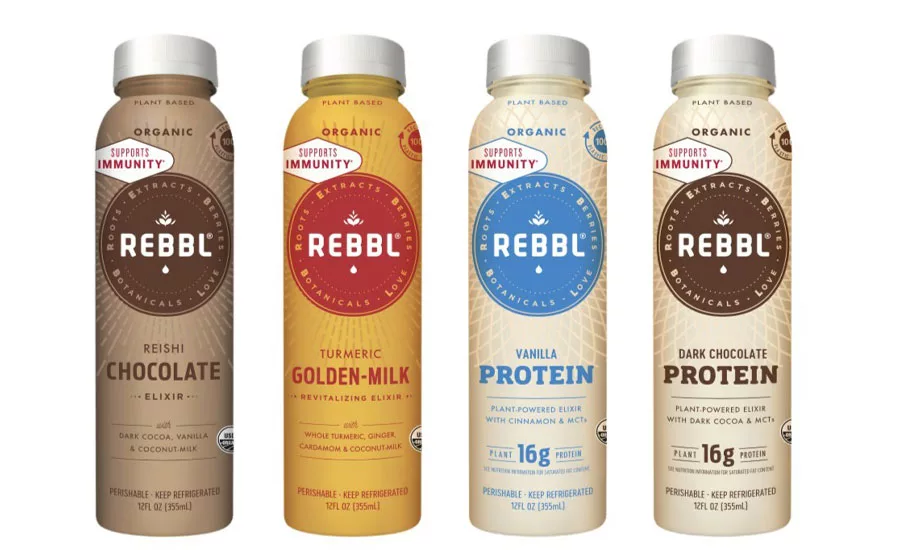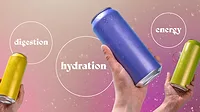Functional beverages see demand increase throughout pandemic
Hydration, immune support claims resonate with consumers

Experts note that the pandemic has amplified consumer interest in functional beverages, particularly those with an immune health claim. REBBL’s immune support comes from an added ingredient, baker's yeast beta-glucan, which is flavorless and generally recognized as safe.
Image courtesy of REBBL
Sir Isaac Newton’s Third Law states that “for every action there is an equal and opposite reaction.” This law has come to fruition among many propulsion systems where machines will produce a thrust that forces objects like airplanes or rockets through the air. In the beverage market, functionality has become the figurative propulsion system driving new product development.
In Chicago-based Mintel’s 2021 report titled “Functional Drinks – US,” Karen Formanski, health and nutrition analyst, noted that concept has been prevalent for many years, but was amplified during the pandemic.
“Functionality has been the most important driver to innovation in the non-alcoholic beverages market for the past decade, and consumer demand for drinks with added benefits has only increased during the pandemic,” she stated. “The number of adults consuming drinks with functional claims has risen over a year ago, as has the number of benefits consumers are getting from these products. Brands that expand to offer options with benefits that appeal to a wider range of shoppers ― especially older adults ― will have the best chance of standing out in an increasingly competitive and blurry space.”
Kishan Vasani, co-founder and CEO of Spoonshot, Minneapolis, also highlights the affect that the pandemic has had on consumers’ beverage choices.
“Beverages have changed a lot over the years, especially in a post-pandemic world where people are more focused on their health and well-being than ever before,” he says. “Consumers are reaching for drinks that are packed with vitamins, minerals, probiotics and other immune-boosting ingredients. That is to say that people want functional beverages that not only taste good, but pack a healthy punch.”
Vasani identifies immune boosting, gut health and skin health as some of the trends fueling these new functional beverage solutions.
“According to Spoonshot, the consumer and business interest grew by 51% and 24%, respectively, between July 2020 and June 2021 around immune-boosting ingredients and their incorporation into their food and drinks,” he says. “Functional beverages have seen a spurt in demand for drinks packed with ingredients linked with strengthening the immunity. These products mostly call out the immune boosting properties of ingredients such as ginger, turmeric, etc.
“Gut health has been linked to improved digestive health, cognition, mood and even immunity,” Vasani continues. “Spoonshot shows that consumer interest in gut health has risen by 77% between July 2019 and June 2021. Fermented beverages are constantly evolving looking to cater to the ever-growing consumer demands in this space.”
Earlier this year, KeVita, a brand of PepsiCo, Purchase, N.Y., released an on-the-go drink offered in a 2-ounce bottle to help support digestive health. KeVita Prebiotic Shots are fermented with water kefir culture and offer 3 grams of prebiotic fiber. The Prebiotic Shots launch is part of KeVita's new brand platform — “For All Gutkind” — which celebrates all guts by highlighting KeVita's range of prebiotic and probiotic drinks, the company says.
Regarding skin health, Vasani credits the desire to look good for the camera as a driver for this function-based market.
“With greater focus on being photo-ready all the time, consumers want to make sure their skin looks great and are turning to a balanced diet to maintain skin health along with cosmetics,” he says. “This has led to new skin diet plans and foods to prevent rapid skin aging. Development of collagen-based beverages is being fueled by this trend. [There’s been] 91.4% growth in consumer interest in this topic between July 2019 and June 2021, as reported by Spoonshot.”
To coincide with National Hydration Day (June 23), VOSS Water released its VOSS+ range, including VOSS + Collagen, which contains 10 grams of collagen in a bottle. The range also features VOSS + Vitamin D, offering 50% of an average adult’s recommended daily intake; and VOSS + Aquamin, which contains a blend of 74 trace minerals and electrolytes to support optimal hydration, the company says.
Although consumer interest remains high for skin health, Vasani notes that the penetration for this function-based claim still is in its infancy with only 0.63% penetration of skin health for beverage fortification. In contrast, weight loss is the top functional attribute in beverage development with a 15.22% penetration, according Spoonshot data.
Meanwhile, Mintel’s report found that 44% of consumers listed hydration as a benefit claim in drink products that they had purchased in the past three months, followed by energy boosting (38%) and calming/relaxing (29%). This was among a base of 2,000 Internet users aged 18 and older, based on data collected in February from Lightspeed/Mintel.
“From hydration to energy to relaxation, even more adults are turning to beverages to support a wider variety of health needs than in 2020,” Mintel’s report states. “Immunity continues to be a sought after function, but it’s not all that consumers are looking for. More than half of consumers get multiple types of benefits via the beverages they consume, including those for immediate needs like a boost of energy or digestive support.”
A functional delivery vehicle
As functionality proliferates throughout the beverage market, the type of beverage can play a vital factor in how beverage-makers approach these innovations, experts note.
“[T]he product attribute has an effect in choosing the type of beverage to be used for innovation,” Spoonshot’s Vasani says. “For example, for skin health and gut health, juices and smoothies are the most preferred category for innovation, whereas for mental health, tea and coffee are the two most preferred categories for innovation.”

Citing Spoonshot data, Vasani notes that “tea is the most utilized beverage category for functional formulations, followed by juices and smoothies.” For tea, the category has a 38.2% penetration rate while juice and smoothies register at a 21.7% penetration rate. Rounding out the Top 5 are coffee (15.8%), carbonated drinks (11.5%) and drink mixes (7.5%).
Although function-based beverages fall within what is considered “new/innovative,” research from Mintel shows that consumers prefer mainstream categories for these solutions.
“While it may be tough to sell some consumers on niche ― yet gradually emerging ― functional drink categories, the majority of adults show interest in getting added benefits from more traditional beverages,” the report says. “Additionally, consumers who currently get functional benefits from drinks like water, juice and coffee are more likely to be interested in repeat usage, when compared to those who are getting them from less-familiar beverages such as kombucha and sparkling water kefir.”
However, Mintel notes that it’s also important for brands to strike a balance between the premiumization status and costs that commonly are associated with functional beverages as well as value perceptions.
“Product experience is the most effective tool to inspire purchase that can be approached with conventional methods or through more unique programs like [direct-to-consumer] (DTC), subscription boxes or in sampling programs in unique venues that align with functionality (e.g., gyms, events, sponsorships),” the report states. “These types of efforts will be even more impactful if they use the opportunity to educate consumers about the quality of ingredients used and company values and feature testimonials from satisfied customers to justify the price for purchasing the product for the long term.”
As beverage-makers examine which product attribute or product type they want to employ, research suggests that need not be too concerned about demographics. In Mintel’s report, the market research firm highlights that a majority of U.S. adults will engage with functional drinks. In fact, nearly three-quarters of the overall population in 2021 is consuming beverages with select benefits, an 8% increase from a year ago, it reports.
“Still, when fears of COVID-19 lessen and consumers return to pre-pandemic routines, it will be important to innovate and expand the number of benefits offered in order to keep current users engaged and invite new users, particularly adults aged 55-plus, to the category as well,” it states.
As consumer demand for function-based beverages continues to rise, beverage-makers now have more opportunities to fulfill this need state.
Looking for a reprint of this article?
From high-res PDFs to custom plaques, order your copy today!





